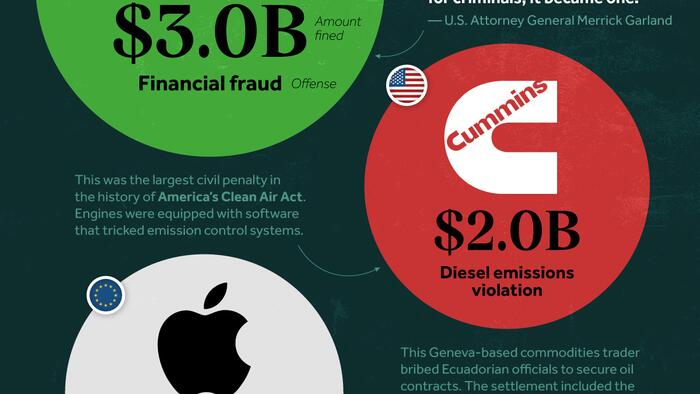In 2024, several major corporations faced significant legal repercussions as government authorities intensified their crackdown on corporate misconduct. Among the most notable cases, TD Bank emerged as a primary example, receiving a staggering $3 billion fine for multiple violations, including breaches of the Bank Secrecy Act and involvement in money laundering activities. The bank’s infractions included enabling three distinct money-laundering networks, which facilitated the transfer of over $670 million over a span of six years. The financial penalty imposed on TD Bank also consisted of $1.3 billion allocated to the U.S. Treasury Department’s Financial Crimes Enforcement Network. Beyond the monetary fine, TD Bank will be under scrutiny through three years of monitoring and five years of probation, underscoring the severity of the violations and the regulators’ commitment to enforcing compliance.
Cummins, an American diesel engine manufacturer, faced a hefty $1.675 billion fine due to egregious environmental violations, making it the largest civil penalty in the history of the Clean Air Act. Like the infamous Volkswagen Dieselgate scandal, Cummins was cited for installing defeat devices aimed at deceiving emissions control testing. This fine illustrates the government’s rigorous stance toward protecting the environment and holds manufacturers accountable for deceptive practices that adversely affect air quality. Moreover, Cummins is also mandated to initiate a recall program at an estimated cost of $330 million, further emphasizing the extent of their liability and the need for accountability within the industrial sector.
The technology sector was not immune to regulatory measures, as Apple received a noteworthy fine of nearly $2 billion from the European Union for anticompetitive behavior. This fine arose from accusations that Apple was restricting app developers from informing users about more affordable alternatives to its Apple Music streaming service. The complaint was initiated by Spotify, which highlighted that developers were subjected to a steep 30% fee on purchases made via Apple’s in-app payment system, a fee that did not apply to Apple’s own services. The investigation revealed that these practices limited European consumers’ ability to make informed decisions, thereby obstructing competition and infringing on market fairness.
These landmark penalties reflect a broader trend in 2024, where regulatory agencies have ramped up enforcement efforts against corporations across various industries. The record-setting fines serve as a clear warning to companies about the risks associated with neglecting legal and ethical responsibilities. The actions taken against TD Bank, Cummins, and Apple stimulate discussions on corporate governance, the responsibility of executives, and the critical importance of adhering to laws designed to protect consumers, the environment, and fair market practices.
The implications of these corporate fines extend beyond financial penalties; they signal a pivotal shift in regulatory attitudes toward compliance and enforcement. As governments continue to place increased pressure on corporations to uphold ethical standards, businesses are likely to reevaluate their operational practices, particularly regarding transparency, accountability, and compliance with established regulations. This shift necessitates a proactive approach to corporate governance, where companies prioritize ethical conduct as central to their strategic initiatives.
In conclusion, the significant corporate fines recorded in 2024 epitomize an era of heightened scrutiny and accountability in the corporate landscape. Companies like TD Bank, Cummins, and Apple serve as salient reminders of the consequences of failing to comply with laws and the potential fallout from unethical practices. As regulatory agencies intensify their oversight, corporations must foster a culture of integrity and make sincere efforts to align their operations with established legal standards to mitigate the risks of facing such severe penalties in the future. This year’s developments emphasize the essential role of responsible business practices in ensuring long-term success and sustainability in an increasingly regulated environment.

